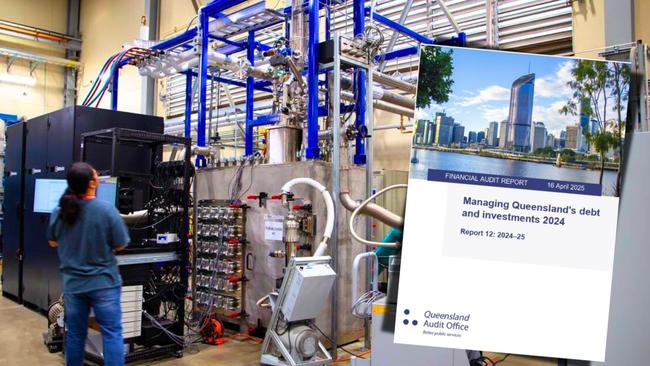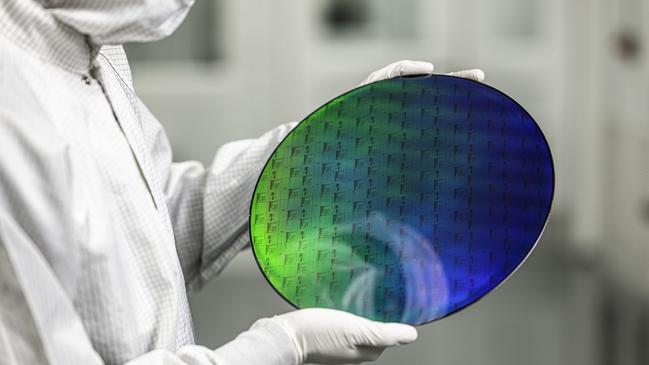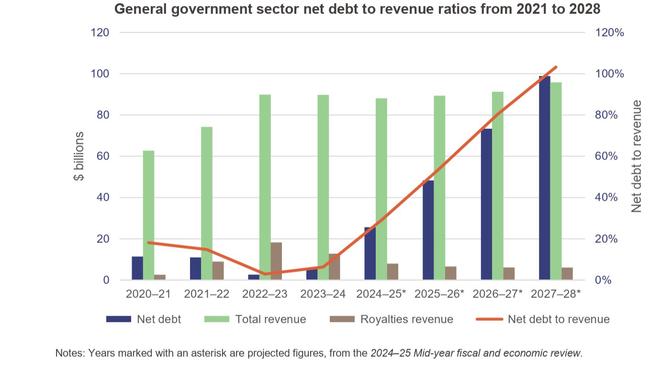Qld Audit Office report on debt reveals quantum computer investment
Buried in Queensland’s latest financial report is a $1 billion gamble: a world-first quantum computer that could transform Brisbane — and global science.

QLD News
Don't miss out on the headlines from QLD News. Followed categories will be added to My News.
A state financial report is rarely the most thrilling reading, but buried within the dense pages of Queensland’s latest financial update is a revelation that could change the future, not just for Brisbane, but for the world.
The state government is investing $470 million into building what could become one of the world’s first utility-scale quantum computer, to be constructed on a site near Brisbane Airport.
The investment, outlined in the Managing Queensland’s Debt and Investments 2024 report, is paired with matching funds from the federal government, bringing the total to nearly $1 billion.
While the broader report focuses on Queensland’s long-term debt, superannuation returns, and infrastructure liabilities, it’s the futuristic project that’s generating the real buzz.
The financial report named California-based tech firm leading the project PsiQuantum with a Treasury spokesman revealing the state was continuing to review the transaction structuring and the state’s equity and loans package.

PsiQuantum spokesperson Alex Mack said the quantum computer would transform Brisbane into the computing and quantum physics capital of the world.
“This isn’t just a computer, it’s a once-in-a-generation scientific leap,” Mr Mack said.
“Quantum computing is like the final frontier of computing — it will solve the smallest, most complex problems in our biggest industries.”
So what does that actually mean?
Rather than using the binary system of ones and zeros that power today’s computers, quantum machines use qubits, units of quantum information that follow the strange and powerful laws of quantum mechanics.
Current machines worldwide operate with around 100 qubits but PsiQuantum’s Brisbane-based system aims to leap ahead with a 1 million qubits-scale system, enough to perform calculations that no conventional computer or AI would be capable of solving.
“This kind of computing power could revolutionise industries from pharmaceuticals to renewable energy,” Mr Mack said.
“One recent project involved simulating the P450 enzyme, which is a common component in cancer drugs.”

In a recent research paper, the company said a quantum computer could help design more effective, safer treatments by more accurately predicting how the enzyme breaks down in the human body.
Another target? Fertiliser.
The world’s food supply still depends on the century-old Haber-Bosch process, an energy intensive and pollutive manufacturing method.
Mr Mack said quantum computing could help engineer a cleaner, cheaper alternative.
The site at Brisbane Airport wasn’t chosen at random as two of PsiQuantum’s four founders studied in Queensland.
PsiQuantum chief executive Jeremy O’Brien completed his post doctorate at the University of Queensland, and co-founder Terry Rudolph hails from Toowoomba.
Foundational quantum computing research has come out of both UQ and Griffith University, and now five Queensland universities are partnering on the project, including QUT and the University of the Sunshine Coast.
“You need space, reliable power, and proximity to talent and Brisbane has been quietly leading the world in quantum research for decades,” Mr Mack said.
PsiQuantum is also reportedly setting up a test lab at Griffith University while the airport site is developed, with an eye on building a local talent pipeline.
Although the $470 million detailed in this week’s Managing Queensland’s Debt and Investments is one of the state’s larger outlays, Mr Mack said the impact would eventually touch and benefit everyone.
“Most people won’t use a quantum computer directly but they’ll benefit from better batteries, faster drug development, and new materials, just like how we all benefit from semiconductors or chips in our phones, even if we’ve never seen one,” he said.
“It will seal Brisbane’s place on the map as a global technology hub which is already in play as the city recently hosted the Quantum Australia Conference, attracting companies including Microsoft and Nvidia.
“With the 2032 Olympics on the horizon, many are seeing this as a moment of global recognition for the Sunshine State.”

It’s a big bet, but one Queensland is clearly willing to make.
And if it pays off, Brisbane won’t just be known for sport and sunshine, it’ll be the city where the future of computing was built.
Along with outlining the structure of the high-stakes quantum computer investment, the Queensland Audit Office report provided an in-depth analysis of the state’s rising net debt, driven by a record capital investment program.
The report forecasted net debt to increase significantly, reaching $159.1 billion by 2027–28, largely due to the capital program and an expected decline in revenue sources such as coal royalties.
It said that as of 30 June 2024, the state’s total borrowings reached $139.2 billion, up from $132.2 billion the previous year.
While the state’s debt remains substantial, the report also highlighted a 15 per cent return on the Queensland Future Fund’s Debt Retirement Fund, which lifted its value to $9.8 billion.
There were also several costly outflows, including a $4 billion withdrawal from the state’s Long Term Assets portfolio — part of Queensland’s financial assets — to fund major initiatives in housing, renewable energy, and cultural infrastructure.
Despite this, the state’s net financial liabilities stood at $24.8 billion, only a marginal increase from 2023.
More Coverage
Originally published as Qld Audit Office report on debt reveals quantum computer investment





